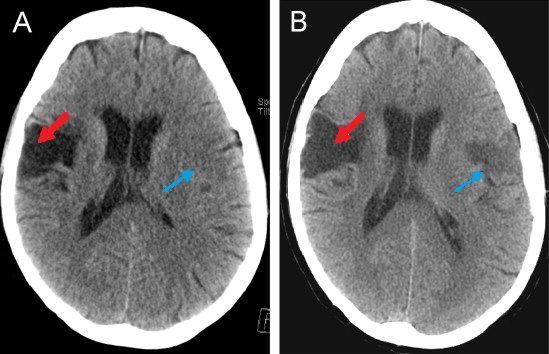Playlist
Show Playlist
Hide Playlist
Ischemic Stroke
-
Slides 01 Stroke Neuropathology I.pdf
-
Download Lecture Overview
00:01 Now, with the ischemic stroke, what we'll do here is divide it into focal versus your global. 00:06 What do you mean by focal? Focal means that you have an individual blood vessel that is undergoing some type of compromise of blood flow to the brain. 00:17 How did it occur? Oh maybe, the patient had some type of thrombi formation taking place in the heart secondary to, let's say, atrial fibrillation. 00:29 And if you remember, atrial fibrillation would be one of the criteria for developing the thrombi, and in essence, the Virchow triad. 00:38 Imagine now that you have a thrombus formation taking place in left atrium. 00:42 What may then happen? At some point in time if there's, let's say, AFib, then the thrombi will break off. 00:49 You embolize into left ventricle and there you go. 00:52 And 10% of the time, you might end up in the carotids. 00:56 And if you do, focally, the embolized thrombus might then become lodged in a smaller cerebral blood vessel and occlude it. This would create an ischemic type of stroke. 01:08 About thrombotic. 01:10 Once again, you have a thrombus formation. 01:12 But this time, it's not in the deep vein of your leg, nor is it in the left atrium. 01:19 But maybe it's actually taking place in a blood vessel in the brain, due to years have gone by and the patient has hyperlipidemia. 01:32 It's atherosclerosis, and it might be atherosclerosis, therefore causing decreased blood flow perfusion to the brain, or a combination of lipohyalinosis. 01:44 What does that mean to you? You know what hyaline is, an aggregation of protein. 01:48 Oftentimes, you know that a patient may have hypertension and diabetes mellitus at the same time. 01:55 And so therefore, lipohyalinosis, what's happening here? There is a thrombus formation taking place in your blood vessel, and therefore, resulting in decreased blood supply to the brain and giving our patient unfortunately, a focus verbal type of ischemic stroke, Or the patient as vasculitis. 02:14 And by vasculitis we refer to something like, oh, temporal arteritis, you've heard it before. 02:19 Arteritis, or maybe something like your granulomatosis with polyangiitis, formerly known as Wegener's. 02:26 Microscopic polyangiitis, you get the point or even, even something like IgA vasculopathy, formerly known as Henoch Schönlein purpura, all of those conditions have one in common. 02:39 They're causing inflammation in the blood vessel. 02:42 Then what then happens to the caliber of the lumen? Oh, it's getting compromised. This is not good. 02:48 May result in what? Good, a focal type of ischemic stroke. 02:52 Are you seeing this now? Or could be cryptogenic. 02:56 In other words, not exactly sure as to what the causes. 02:59 So on this side, it would be focal type. 03:02 And then on this side globally, what may happen? Well, globally, your patient may be suffering from hypotension. 03:09 Globally, versus focally. 03:12 So, if the entire body is undergoing hypotension, then there's going to be decreased blood supply obviously to the brain. 03:20 Once again, causing ischemic type of stroke, but this is global in nature. Keep that in mind.
About the Lecture
The lecture Ischemic Stroke by Carlo Raj, MD is from the course Stroke (Cerebrovascular Accident).
Included Quiz Questions
What is the most common cause of focal cerebral ischemia?
- Atherosclerosis
- Alzheimer disease
- Traumatic brain injury
- Vasculitis of the middle cerebral artery
- Acute hypotension
Which of the following is the most likely cause of global cerebral ischemia?
- Hypotension resulting from acute blood loss
- Embolization of the internal carotid artery
- Lipohyalinosis of small blood vessels
- Pulmonary thromboembolism
- Atherosclerosis of the middle meningeal artery
Customer reviews
5,0 of 5 stars
| 5 Stars |
|
1 |
| 4 Stars |
|
0 |
| 3 Stars |
|
0 |
| 2 Stars |
|
0 |
| 1 Star |
|
0 |
Very clear and concise definitions of stroke vs TIA. I appreciate that Dr. Raj underlines the importance of TIA treatment as a risk factor for a stroke.




